Opinion | Why Hong Kong does not need an artificial island to solve its housing crisis
- Destroying the city’s natural assets to provide public housing would be a disastrous policy
- With numerous brownfield sites and vacant properties, the solution to the problem is surely obvious

Back in the 1990s, Post Magazine ran a column called Parallel Lives, which featured side-by-side interviews with two people who had something in common – a guest house owner and the marketing manager of a five-star hotel group, perhaps.
Were the column still running, I’d like to see a tycoon living in a megabucks mansion cheek-by-jowl with a cage-home inmate. It’s a cliché, for sure, but it might shed some light on Hong Kong’s current housing issues.
Some facts: Hong Kong (1,106 sq km) is pressed for space. This makes renting or buying a property expensive – indeed, real estate here regularly ranks as the world’s most unaffordable. Young adults who can’t afford to move to a place of their own face the prospect of living with mum and dad until the parents stop living – only then do they become head of the household.
The situation isn’t eased by the city’s larger property and construction companies, whose vision is – not unnaturally – occupied with making a fat profit rather than making sure each of Hong Kong’s 7.5 million inhabitants has their own des res.
Environmentalists talk of degradation. Sociologists are alarmed by the effects that the project would have on Hong Kong’s rus in urbe persona. Economists deplore the prospect of “pouring money into the sea”. And for anyone who is not some sort of “ist” – but simply a resident who’s revelled in the marine panoramas that stretch around our shores – there’s the depressing realisation that one of our natural assets could well be going to disappear under a humungous concrete cowpat.
